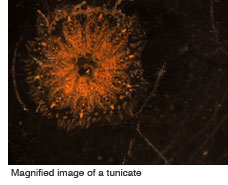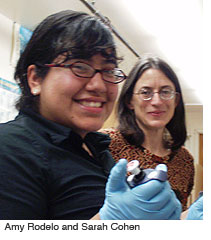 Funding
from the National Science Foundation's Research Experience for
Undergraduates and Field Station Marine Lab programs has provided Amelia
(Amy) Rodelo with the opportunity to study a non-native marine invertebrate
that is contributing to the disappearance of native species in San Francisco
Bay. Rodelo, who starts her senior year this fall, will conduct her research
at the Romberg Tiburon Center for Environmental Studies throughout the
summer. Funding
from the National Science Foundation's Research Experience for
Undergraduates and Field Station Marine Lab programs has provided Amelia
(Amy) Rodelo with the opportunity to study a non-native marine invertebrate
that is contributing to the disappearance of native species in San Francisco
Bay. Rodelo, who starts her senior year this fall, will conduct her research
at the Romberg Tiburon Center for Environmental Studies throughout the
summer.
The San Francisco native will cultivate colonies of tunicates, tiny
animals in the botryllid family, which are commonly found attached
to rocks, docks and pier pilings in coastal and inland salt water.
Building upon previous efforts, she hopes to shed more light on the
immune system-related behavior and reactions of the species to such
environmental fluctuations as salinity and temperature.
 Rodelo will use such genetic techniques as polymerase chain reaction
(PCR) to make copies of the genes she wants to examine more closely,
and then sequence these with a DNA sequencer. The sequencing will allow
her to make fine scale comparisons among populations of the invertebrates,
which will contribute to data collections focusing on how immune systems
evolve and adapt to varying environmental conditions. Rodelo will use such genetic techniques as polymerase chain reaction
(PCR) to make copies of the genes she wants to examine more closely,
and then sequence these with a DNA sequencer. The sequencing will allow
her to make fine scale comparisons among populations of the invertebrates,
which will contribute to data collections focusing on how immune systems
evolve and adapt to varying environmental conditions.
"This is a great opportunity for me to hone my wet lab-culturing
skills and other scientific techniques while I work with other students," said
Rodelo. "I am also looking forward to learning as much as possible
about the molecular techniques that we use in the gene lab." She
hopes her experience combining ecological and genetic studies will
provide some of the foundation that will one day allow her to plan
and execute a multi-dimensional project in genetic research.
"Amy is a remarkable student who has progressed from
a job as a veterinary receptionist to her role as a talented young
researcher
in marine organismal biology and genetics at SF State," said
Sarah Cohen, assistant professor of biology who is directing Rodelo's
research. "She's a gifted observer... exceptional at
describing in thoughtful detail what she observes."
Rodelo first became enamored of the natural world during her freshman
year in a biology 240 class, which focused on evolution, biodiversity
and ecology. "I was really attracted to and fascinated with
biology as a whole and evolutionary biology in particular," said
Rodelo. Already a regular San Francisco Bay swimmer, she quickly
became interested
in marine biology.
The young researcher is comfortable collecting samples
of marine life from muddy environs. "I love being covered in muck," said
Rodelo. "I want to know what it feels like to be larvae."
Last semester Rodelo expanded her knowledge of species and habitats
when she volunteered in Thailand to observe sea turtles during egg-laying,
part of a study to examine the effects of poaching.
Rodelo plans to earn a doctorate in biology after graduating from
SF State.
-- Denize Springer
 |
